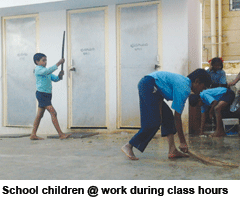Even as the BJP government in Karnataka (pop.60 million) has gone into overdrive during the past month to implement the Right to Free and Compulsory Education (aka RTE) Act, 2009 in private day schools which — post the April 12 verdict of the Supreme Court — are obliged to reserve 25 percent capacity in class I for poor children from their neighbourhood, it’s turning a convenient blind eye to implementation of the Act in its own (government) schools. A recent audit conducted by the National Commission for Protection of Child Rights (NCPCR) and South India Cell for Human Rights Education and Monitoring (SICHREM) measuring the extent to which 47 government, municipal and aided primary schools in Bangalore are RTE compliant, has unearthed shocking facts and figures. S.19 (1) and the Schedule of the RTE Act require all schools — including government elementaries — to meet stringent infrastructure and teacher-pupil norms before April, 2013.
According to the audit report whose conclusions were disclosed at a press conference in Bangalore on May 24, a majority of government elementaries (primaries and upper primaries) surveyed lack drinking water facilities while their toilets are in unusable condition with no separate facilities for girl students. Most of the schools surveyed don’t offer playgrounds or library. The computers provided by the state government for ICT-in-education were locked up and “dumped in a room and filled with dust”, and the quality of the mid-day meal is poor. Shockingly, the audit conducted by SICHREM personnel who visited the schools twice weekly over three months (January-March), reveals that “children are being used to clean toilets, carry and wash mid-day meal utensils. No Group-D ayah (helper) has been appointed despite government circulars available relating to appointment of ayahs in primary schools… Teachers are using children especially girls, to do domestic work”.
 The audit also found that even though 2,335 children from the 47 schools surveyed were eligible to receive government scholarships (Rs.250 per student per year) earmarked for scheduled castes (SC)/scheduled tribes (ST), none of them had been awarded because parents couldn’t furnish ‘caste certificates’. Parents alleged that state government officials demanded bribes of Rs.500-1,000 — amounts much higher than the value of the scholarship — for issue of the certificates.
The audit also found that even though 2,335 children from the 47 schools surveyed were eligible to receive government scholarships (Rs.250 per student per year) earmarked for scheduled castes (SC)/scheduled tribes (ST), none of them had been awarded because parents couldn’t furnish ‘caste certificates’. Parents alleged that state government officials demanded bribes of Rs.500-1,000 — amounts much higher than the value of the scholarship — for issue of the certificates.“Though we expected shortcomings, the poor condition of government and municipal schools exceeded our worst fears. Because of this, little teaching-learning happens in the classroom. If this is the situation in the state’s capital, I hate to think what it must be like in rural Karnataka. The provisions of the RTE Act are being blatantly violated by the state government in its own schools. NCPCR will be submitting a full report demanding an explanation and immediate remedial action,” says Gangadhra Reddy N, the Bangalore-based district coordinator — Social Audit (RTE) of SICHREM.
While the RTE Act invests the power to withdraw the all-important ‘recognition’ status and levy a fine of upto Rs.10,000 per day for contravention by private schools in government officials, it exempts government school managements from any legal accountability for failure to implement the Act. Little wonder that ever since the Karnataka state government notified the state’s Rules for the RTE Act on April 28, its education department has been busy shooting off circulars to private schools to admit 25 percent poor children from their neighbourhood starting from this academic year in June. Meanwhile the state’s block education officers, emboldened by the wide discretionary powers vested in them by the Rules, have been unusually busy asking parents to submit quota admission applications to their offices which they will in turn forward to private schools, which have been threatened “with action” if the applications are rejected.
“The SICHREM social audit on implementation of the RTE Act in government schools in Bangalore is just the tip of the iceberg; the rot has spread wide and deep in government schools. But since the RTE Act does not mandate any punitive provisions and accountability for government schools, I don’t believe infrastructure and academic standards in these schools will ever improve. The Act will be used by education officials to harass and shake down private school managements,” says a principal of a well-known private school in Bangalore, speaking on condition of anonymity.
However, Prof. A.S. Seetharamu, former professor of education at ISEC (Institute for Social & Economic Change), Bangalore and education advisor to the Karnataka government, believes the state government is serious about implementation of the RTE Act in all — including government — schools, and has prepared a detailed action plan. “The state government is committed to implementation of the RTE Act in all schools. Every government school will be asked to prepare a School Development Plan detailing infrastructure, teacher and curriculum needs. These plans will be implemented to fully comply with provisions of the RTE Act. There will also be external as well as internal audits of government schools to ensure compliance. While I agree the government needs to implement these plans effectively and quickly on the ground, it can’t escape the RTE Act. It’s upto civil society and NGOs to ensure implementation of the RTE Act and improvement of standards in government schools,” says Seetharamu.
But as the NCPCR-SICHREM audit has shown, the rot in public primary education is deep. It requires more than band-aid solutions.
Summiya Yasmeen (Bangalore)























